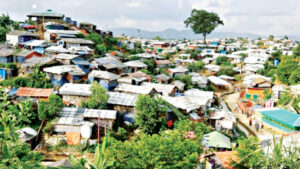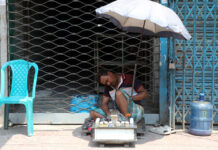By Kamran Reza Chowdhury on Apr 28, 2022 Benar News
Amnesty International and other human rights groups urged the Bangladesh government Thursday to support community-led learning facilities for Rohingya refugees, saying the authorities had recently shut down 30 community-led schools at camps in southeastern Cox’s Bazar district.
The rights groups and NGOs said that nearly half a million Rohingya refugees in Bangladesh are children who have been deprived of access to education through an accredited curriculum since their families sought shelter in the South Asian nation in August 2017. That was the year when more than 740,000 Rohingya Muslims fled a brutal crackdown by the Burmese military in Rakhine, their home state in Myanmar.
“Ensure access to education for all Rohingya children by building capacity for all learning facilities within the refugee camps including by granting legal status to community schools in line with their international commitments,” the groups urged Bangladesh.
“Immediately re-open all community schools and put a stop to all harassment, threats and attacks against refugees, avoid any discriminatory policies that affect the right to education of Rohingya children in Bangladesh,” they added.
Human Rights Watch, one of the 25 groups that signed the joint letter, last month had accused Dhaka of threatening Rohingya with forced relocation to the remote island of Bhashan Char if they violated a ban on setting up schools in refugee settlements in Cox’s Bazar, the southeastern district that borders Rakhine.
Bangladeshi officials said they only shut private tuition centers and not schools that were officially authorized.
“It is a total lie that we closed the schools,” Shah Rezwan Hayat, the refugee relief and repatriation commissioner, told BenarNews.
“We have not shut or eradicated any school. Actually, we removed some coaching centers in the interest of security inside the camps,” he said.
However, an official of the armed police battalion (APBn), a specialized police unit tasked with ensure security at the camps, acknowledged that some schools had been shut because they were allegedly being misused for unlawful activities.
“The schools were closed on the basis of information that these were being used for violent and criminal activities,” Kamran Hossain, an additional superintendent of APBn, told BenarNews.
One refugee leader said that community-based schools run by small NGOs, Rohingya community leaders, or Islamic groups had been shut.
“Thirty-thousand children cannot get an education because of the closure of community-based schools,” Md. Saiful Islam, a Rohingya leader at the Kutupalong refugee camp in Ukhia sub-district, told BenarNews.
“This [closure of schools] will darken the future of the Rohingya children, the lives of many Rohingya children are in jeopardy. Many of the children have been sitting idle at the camps and criminal gangs and syndicates have been trying to lure them. We urge the authorities reopen the schools,” he said.










